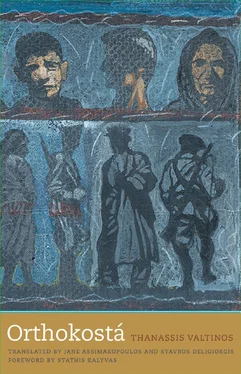Forty years on, during the writing of the book, many of the bloodstained locales in the Peloponnesus were renamed — some even removed — as if chora had been acting the author: revising, crossing out, and rewording the screed on the ground. In keeping with the fragility and transitoriness of power, as quoted from the book of Psalms in the epigraph of Orthokostá , Valtinos’s sobering conclusion closely parallels George Seferis’s poem “The King of Asine.” When the “things of this world” are said and done (and turned to dust) — Asine being in the Argolis prefecture, only a few miles north of Orthokostá—some Mycenaean-age turannos’ s mask of beaten gold may still survive and give back a tinny sound when a pebble is dropped on it.
A novel is the onset of a new creation. During the fourteenth-century Plague in Florence, and a generation before Chaucer, Giovanni Boccaccio arranged for his storytellers’ brigade, some of whom are related to each other, just as some of the Orthokostá characters are, to meet in the church of Santa Maria Novella. And just like the Decameron and the Canterbury Tales before it, Orthokostá is an organ diapason drowning out all the personalist, jejune readings and rewritings of our times, as Derek Walcott’s Omeros would have put it, which achieve little else besides making literature as guilty as history.


Thou shalt dash them in pieces like a potter’s vessel.
— Psalm 2:9
In the shadow of Mount Malevós , 1 at its foothills and not too far from Orióntas Province, there stands a monastery called Orthokostá celebrating the Ninth-day Feast of the Dormition of the Virgin . 2 It was erected in early Christian times but was destroyed and looted around the year 1724 by Saracens, who repeatedly raided and pillaged the region of Tsakoniá 3from all sides. The monastery was immediately rebuilt upon the still visible ruins by a monk named Barnábas Kafsoxyliótis, who truly led a hermit’s life, equal unto an angel, and was erudite in both secular and holy learning. And although at present the monastery has lapsed from its former beauty, it is once again flourishing, inhabited by approximately sixty monks who busy themselves regularly with all manner of agricultural tasks and most of the arts. Its verdant gardens boast a variety of fruit trees, while in the Foúska plain below, which is especially hospitable to olive groves, wheat, barley, beans, and other vegetables are grown, and even vineyards yielding rich vintages of mirth-inducing wine of cinnamon color. The river Mégas, descending from Mount Malevós and fed by so many streams it becomes torrential, runs through the valley. One might almost say that the entire well-being of the monastery depends on it. On the left bank of the river and along the length of the hills there is a vein of lead and silver that remains to this day unexploited. According to a belief that is hard to confirm, the underground course of this vein can be clearly traced if every year, on the morning of August 23 before dawn, one stands silently, facing east, on the upper balcony of the monastery. From this same balcony the eye can see as far as the Sea of Náfplion bounded to the north by the peak of Mount Karakovoúni, to the south by the Cape of Saint Andréas, and to the east across the sea reaching well beyond the island of Spétses. A lower mountain range encircles the area from Cape Karakovoúni all the way to that of Saint Andréas and, extending three or four miles out from the sea, it shelters the Foúska plain from the Northerlies, which may well be the cause of the heat waves during the summer. The grounds around the monastery are delightfully wooded and green the year round in any weather, its ice-cold, crystal-clear, healthful waters bestowing great delight and refreshment upon its guests .
ISAÁKIOS, BISHOP OF RHÉON AND PRASTÓS
An Account of the Country of Prasiae and Thyreátis
All day long the wind carried ashes down toward us. But it was quiet. In the evening we sat out in front of the house, and the men saw five people heading out from the Makrís property and going off. They went down a ways to a clearing, and they saw two of them going into the Koúros gorge, and the other three going up toward Masklinéki Vigla. 1The men came back, they said, Something’s up, we’re clearing out because they’re going to arrest us tonight. They’ll kill us. And they left right then and there. They told us women, Collect your things, get the animals out tomorrow, away from Koubíla, don’t leave anything behind. Because something’s up. They left, and we left in the morning, break of day. Me, the shepherds’ wives, and my sister-in-law, Yiórgos’s wife. Yiórgos the lawyer. She’d come there from Trípolis, they had Yiórgos in the detention camp, they’d arrested him. We gathered up the goats from Lákka. Tsioúlos’s widow was there, Lioú. 2She tried to catch some hens to take with her, she had a rooster, it got away from her. She says, Let’s not be too long, because the men told us to leave, I’ll come back and get it tonight. She went back that night, but the rooster wasn’t in the coop. They go out looking, she had her two eldest children with her, ten, eleven years old, they see feathers down on the threshing floor. Lioú says, That brute, he killed our rooster.
The next day they took me in. That’s when it was. I’d come from Kastrí. I left with Paraskeví that evening. The men sent me to check the house, and so I wouldn’t be alone I stayed with your girls, Iríni. At your place. I went out to the square to go to your house, I see a lot of people. Where the Telephone Company is now. They’re saying, They burned down Ayiasofiá 1last night. There was killing and the like. I leave, I go to Chrónis’s pharmacy. He says, Yeorghía, they saw your brothers in Másklina. 2I didn’t know a thing. What are you talking about, Lámbros? I started crying. I went up to your house. Yiórgos Haloúlos was there. He was with Anthí. Pavlákos was there, down at the butcher’s. At Goúnas’s. In the doorway. And he gave me a look, like that. Nikólas did. I go find Yiórgos and Anthí. They were talking about me. I was terrified after Lámbros told me about my brothers, that they’d seen them in Másklina. Because I was the one would pay for it. Don’t worry, Yiórgos Haloúlos tells me. We were just talking about you, to see where to hide you. Well, anyway. Anthí takes me, and we go to the shack, you know, the shack, Iríni. To see if I could stay there. I tell Anthí. I was a young girl, in the prime of my youth. I tell her, Anthí, honey, that Pavlákos fellow was giving me the eye. Sly-like, you know. That son of a bitch, says Anthí. That son of a bitch. Don’t pay him any mind. Later on I understood why he was looking at me. That night Pótis Lenghéris comes by. Who doesn’t know anything yet. I was still with the girls. He says, They want you at the office. The office was at Mángas’s house. They want to question you, he says. He takes me there. Mángas’s house was just a few steps away. We go inside. I see the Koutsoyiánnis family from Douminá. Relatives of the others who’d left with our brothers. It must have been evening. The sun must have set. Stávros Koutsoyiánnis, his son Yiórgos and Vasílis Koutsoyiánnis’s wife. I started crying. I also saw some villagers from Ayiasofiá. They’d arrested them the same day. The day after they burned down their village. It was July, because we were harvesting. And there I am crying. Your father comes in, the girls had fixed me something to eat. He brought me eggs with potatoes.
Читать дальше




